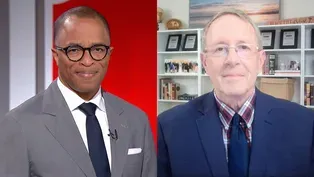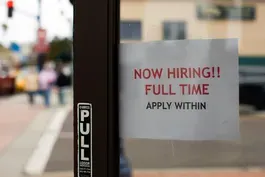
White House adviser discusses deal to raise debt ceiling
Clip: 6/2/2023 | 5m 54sVideo has Closed Captions
White House adviser Gene Sperling discusses bipartisan deal to raise debt ceiling
Crisis averted. That's the message from lawmakers as the bill to raise the debt ceiling makes its way to President Biden's desk. For the White House perspective on the deal, Amna Nawaz spoke with senior adviser Gene Sperling.
Problems with Closed Captions? Closed Captioning Feedback
Problems with Closed Captions? Closed Captioning Feedback
Major corporate funding for the PBS News Hour is provided by BDO, BNSF, Consumer Cellular, American Cruise Lines, and Raymond James. Funding for the PBS NewsHour Weekend is provided by...

White House adviser discusses deal to raise debt ceiling
Clip: 6/2/2023 | 5m 54sVideo has Closed Captions
Crisis averted. That's the message from lawmakers as the bill to raise the debt ceiling makes its way to President Biden's desk. For the White House perspective on the deal, Amna Nawaz spoke with senior adviser Gene Sperling.
Problems with Closed Captions? Closed Captioning Feedback
How to Watch PBS News Hour
PBS News Hour is available to stream on pbs.org and the free PBS App, available on iPhone, Apple TV, Android TV, Android smartphones, Amazon Fire TV, Amazon Fire Tablet, Roku, Samsung Smart TV, and Vizio.
Providing Support for PBS.org
Learn Moreabout PBS online sponsorshipAMNA NAWAZ: Crisis averted, that's the message from lawmakers as the deal to raise the debt ceiling makes its way to President Biden's desk.
For the White House perspective, I spoke earlier today with Gene Sperling, senior adviser to President Biden.
Gene, welcome back.
And thank you for joining us.
GENE SPERLING, Senior Adviser to President Biden: Thank you for having me.
AMNA NAWAZ: So this deal does protect a number of key Biden investments, infrastructure, semiconductors and so on.
But some groups have called it a betrayal.
For those people who do feel that betrayal, older food stamp recipients, folks who think this makes the climate crisis worse, what is your message to them?
GENE SPERLING: Well, first of all, let's remember this past with large bipartisan majorities, and that 165 Democrats voted for this in the House, 56 in the Senate.
They looked and saw overall that this was a strong agreement that protected these basic values of economic justice and climate change.
And so my response would be, understand the president completely protected the investment -- the Inflation Reduction Act with the historic, historic investments in climate change.
He completely protect protected Medicaid, education, Medicare, Social Security.
And we do realize that, when we made some changes, egregious changes on the work requirements for SNAP, for food, that there were some people, some people in the 50-54 age, that would be negatively affected, and we will do everything to have their back.
But, on net, this actually reduced hunger, increased SNAP and reduced the number of people who would lose SNAP benefits due to work requirements.
AMNA NAWAZ: But let me ask you about those negotiations in the first place, because, for months, the president was repeatedly saying there would be no negotiation over raising the debt ceiling.
He said it in January, again at his State of the Union in February.
As late as late April, he was saying that ceiling is non-negotiable.
And then he sat down with Speaker McCarthy and empowered a team of negotiators.
So, what forced the president to reverse course on that?
GENE SPERLING: Well, I would agree or disagree on reversing course.
What the president did was pound home the basic value that default was not an option, that it was OK to negotiate with divided government on a budget agreement and to even accelerate that negotiation, but that the idea of using the threat of default to extort extreme cuts was not something he was going to tolerate.
And I think that this agreement overall is very close to the kind of budget agreement that happens in divided government.
So I do think his value that we're not going to default, we're not going to threaten to default, no one's going to use the threat of default to extort extremist positions, I think he held firm on that.
I do think it is absolutely worth us as a country trying to think through how we can prevent even the appearance of extortion due to a threat of default.
But I think, in very, very many ways, the president held on to that value and was able to get an agreement that met that basic principle.
AMNA NAWAZ: But, Gene, as you know, coming out of the 2011 debt ceiling negotiations, the Republican takeaway from that moment was it could be used for leverage.
And by negotiating once again, I wonder if you worry the president has now emboldened Republicans in the opposition to do this again and again?
GENE SPERLING: Well, look, I was one of the negotiators in 2011.
And that was a scary, difficult time.
And you saw the stock market go way down, hurting people's retirements.
You saw lost jobs.
You saw consumer confidence get hit.
You saw us downgraded.
So that was a very harmful period.
I don't think that we saw that happen this time at all.
And so I do think the president's values of not threatening on default, or not negotiating with people trying to do -- take extreme positions did take hold.
I think the really unfortunate thing was that, after 2011, up until now, all Democrats and Republicans really avoided even getting close to this type of situation.
So I think we have fought back at it successfully.
I think it's unfortunate that the Republicans took that posture, and did try to use the debt limit as the occasion for bringing things on the table that may not have fit at this point.
AMNA NAWAZ: It didn't turn out the same way as it did in 2011.
The consequences were not the same.
But it did come down to the wire.
I wonder how you think we avoid this in the future, or whether this is just the way it will be.
GENE SPERLING: I hope not.
And I think that it's an important thing to recognize that Speaker Pelosi never did this type of high-wire act when President Trump sought to raise the debt limit three times.
And so there has been consistent view from the Democrat progressive side.
And I think it is very important that we think of what type of policies we could do going forward to prevent this.
And it should be forbidden or it should be so heavily discouraged and against any norms that no one should take advantage of that basic responsibility the president has to all the people to seek to extort or extreme measures.
I don't think the Republicans should have put this in this posture.
I do think, at the end of the day, the president was able with his leadership to get them to agree to something that was not fully, but close to the type of bipartisan agreement you would have in a budget in divided government.
AMNA NAWAZ: Gene Sperling, White House senior adviser to President Biden, thank you so much for joining us.
GENE SPERLING: Thank you.
Thank you very much.
Attacks in Russia raise questions about next phase of war
Video has Closed Captions
Clip: 6/2/2023 | 7m 42s | Attacks inside Russia raise questions about next phase of Ukraine war (7m 42s)
Breaking down the NBA Finals between Denver and Miami
Video has Closed Captions
Clip: 6/2/2023 | 6m 6s | Breaking down the NBA Finals matchup between Denver and Miami (6m 6s)
Capehart and Abernathy on the debt deal and 2024 campaign
Video has Closed Captions
Clip: 6/2/2023 | 11m 44s | Capehart and Abernathy on the debt deal and race for the GOP presidential nomination (11m 44s)
Economy adds jobs despite inflation, interest rate hikes
Video has Closed Captions
Clip: 6/2/2023 | 6m | U.S. economy adds more jobs in face of inflation and interest rate hikes (6m)
Greenland unveils draft constitution in independence effort
Video has Closed Captions
Clip: 6/2/2023 | 8m 24s | Greenland unveils draft constitution in push for complete independence from Danish control (8m 24s)
Providing Support for PBS.org
Learn Moreabout PBS online sponsorshipSupport for PBS provided by:
Major corporate funding for the PBS News Hour is provided by BDO, BNSF, Consumer Cellular, American Cruise Lines, and Raymond James. Funding for the PBS NewsHour Weekend is provided by...















